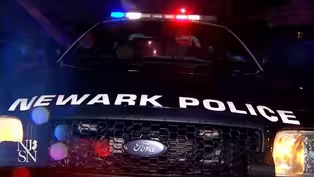NJ Spotlight News
Does Amazon's delivery model harm workers?
Clip: 7/11/2025 | 6m 32sVideo has Closed Captions
Interview: Maya Pinto, National Employment Law Project
A report by the National Employment Law Project explored how the company meets the “faster than ever” delivery speeds at the heart of its business model by using an army of Amazon Flex drivers, independent contractors who use their own vehicles to deliver packages in the final leg.
Problems playing video? | Closed Captioning Feedback
Problems playing video? | Closed Captioning Feedback
NJ Spotlight News is a local public television program presented by THIRTEEN PBS
NJ Spotlight News
Does Amazon's delivery model harm workers?
Clip: 7/11/2025 | 6m 32sVideo has Closed Captions
A report by the National Employment Law Project explored how the company meets the “faster than ever” delivery speeds at the heart of its business model by using an army of Amazon Flex drivers, independent contractors who use their own vehicles to deliver packages in the final leg.
Problems playing video? | Closed Captioning Feedback
How to Watch NJ Spotlight News
NJ Spotlight News is available to stream on pbs.org and the free PBS App, available on iPhone, Apple TV, Android TV, Android smartphones, Amazon Fire TV, Amazon Fire Tablet, Roku, Samsung Smart TV, and Vizio.
Providing Support for PBS.org
Learn Moreabout PBS online sponsorshipIn our spotlight on business report tonight, Amazon's mega Prime Day sale officially ends tonight, but there could also be a dark side to shopping with the retail giant.
A new brief from the National Employment Law Project sheds light on how the company meets that faster than ever delivery speed at the heart of its business model.
It's by using an army of Amazon Flex drivers.
These are independent contractors who use their own vehicles to deliver packages in the final leg or last mile of the delivery process.
According to the report, that Uber-like system exploits workers and subjects them to illegal and unbearable conditions, having a ripple effect on the rest of the delivery sector.
Maya Pinto is the report author.
She's a senior researcher and policy analyst at the National Employment Law Project, and she joins me now to explain.
Maya, welcome to the show.
Thank you for your time.
Your report describes Amazon Flex as having this precarious labor model.
What specifically with these conditions are you talking about?
Yes, thank you for that question, Brianna.
So what the report does is it takes a look at, as you mentioned, this Uber-like delivery app called Amazon Flex, and it identifies key elements of the Flex labor model.
So digital surveillance, algorithmic management, independent contractor, misclassification, forced arbitration, and class action waivers, and taken together, all create a control without responsibility labor model that allows Amazon to exert a great deal of control over Flex delivery drivers without any real legal responsibility for the worker impacts of that control.
And so what the report does is it connects those labor practices to job quality issues, like systematic wage theft, like unsafe work pace, and job insecurity that Flex drivers are experiencing.
I mean, this is not an issue that we're unfamiliar with here in New Jersey.
Last year, you may know, there were workers, Amazon Flex workers, who rallied in Woodland Park.
They were talking about better working conditions, but also that their wages had dropped significantly.
How though does that model sort of, as you say, set them up for this?
Are they not selecting their own hours?
How long they work, where they work?
Isn't that sort of the whole purpose of this gig economy?
Absolutely.
So the Flex app is absolutely marketed to Flex drivers as an opportunity to have control over their schedules, to be their own boss, to choose their own hours, but it's actually Amazon that, you know, batches out the routes, that sets the timeframes, which workers see which offers and when.
And so we spoke, you know, for this report, I spoke to Flex drivers who are organizing in New Jersey, and they reported that often they can be locked out of the app when they've worked a certain amount, a number of hours, when they want work, and they log into the app, they're not able to find work.
And so it's very unstable, the hours, and unpredictable.
The Flex labor model is designed to give Amazon, really, the flexibility to sort of treat workers how they want, to engage workers when they want, and then to pay them whatever they want.
They don't have to meet the minimum wage standards.
They don't have to pay into social insurance systems.
And so while it's marketed as a tool to give workers flexibility, it's really about giving Amazon flexibility.
- I wonder, just quickly, Maya, about some of the broader implications, which you talk about in the report, how if this model does become sort of standard for this sector, what that might mean for the delivery business in the future, and I guess also for workers' rights.
- Yeah, so I mean, last mile delivery has, you know, been a bastion of actually unions and high-quality family-sustaining unionized work.
You know, Amazon Flex now has been around, actually, for around a decade, and it's really grown, and it's a huge piece of the Amazon Flex delivery operation.
And what we've seen is that, actually, other retailers like Walmart now has a Flex-like delivery app called Spark, and Target has shipped.
- Yeah, I know you have a number of recommendations.
Can you give us just a handful?
- Yeah, so I mean, fundamentally, Amazon needs to be held accountable for its Flex labor model, and worker organizing and public policy change are the best ways to ensure that it's held accountable.
It's not gonna change its labor model on its own.
I mentioned digital surveillance and algorithmic management are key labor practices, so there should be transparency and accountability requirements around Amazon's use of those practices.
We also need to figure out ways to combat independent contractor misclassification, and New Jersey is really leading the way.
Right now, there's rulemaking in New Jersey around the employment standard for its employment laws, and Flex drivers will be weighing in because New Jersey actually has a really expansive standard, and we hope that it will continue to be a beacon for workers' rights.
- Yeah, there's been a lot of talk about that misclassification law.
Maya Pinto is with the National Unemployment Law Project.
Maya, thanks so much.
- Thank you.
- Support for "The Business Report" is provided by the Newark Alliance Presents the 2025 Halsey Fest, featuring the vibrancy of Newark's Arts and Education District and Halsey Street.
Halsey, a neighborhood built on hustle and heart.
The 2025 Halsey Fest schedule is available at halseynwk.com.
(upbeat music) [MUSIC PLAYING]
Bill would ban ICE agents from wearing masks during arrests
Video has Closed Captions
Clip: 7/11/2025 | 1m 20s | Some agents wear unmarked tactical gear, face masks and no visible badges (1m 20s)
Newark youth curfew aims to support, not punish
Video has Closed Captions
Clip: 7/11/2025 | 4m 18s | How the city is providing resources for youth during summer months (4m 18s)
Opioid money diverted, harm reduction groups dismayed
Video has Closed Captions
Clip: 7/11/2025 | 4m 51s | NJ lawmakers moved $45M from local organizations (4m 51s)
Providing Support for PBS.org
Learn Moreabout PBS online sponsorship
- News and Public Affairs

Top journalists deliver compelling original analysis of the hour's headlines.

- News and Public Affairs

FRONTLINE is investigative journalism that questions, explains and changes our world.












Support for PBS provided by:
NJ Spotlight News is a local public television program presented by THIRTEEN PBS


